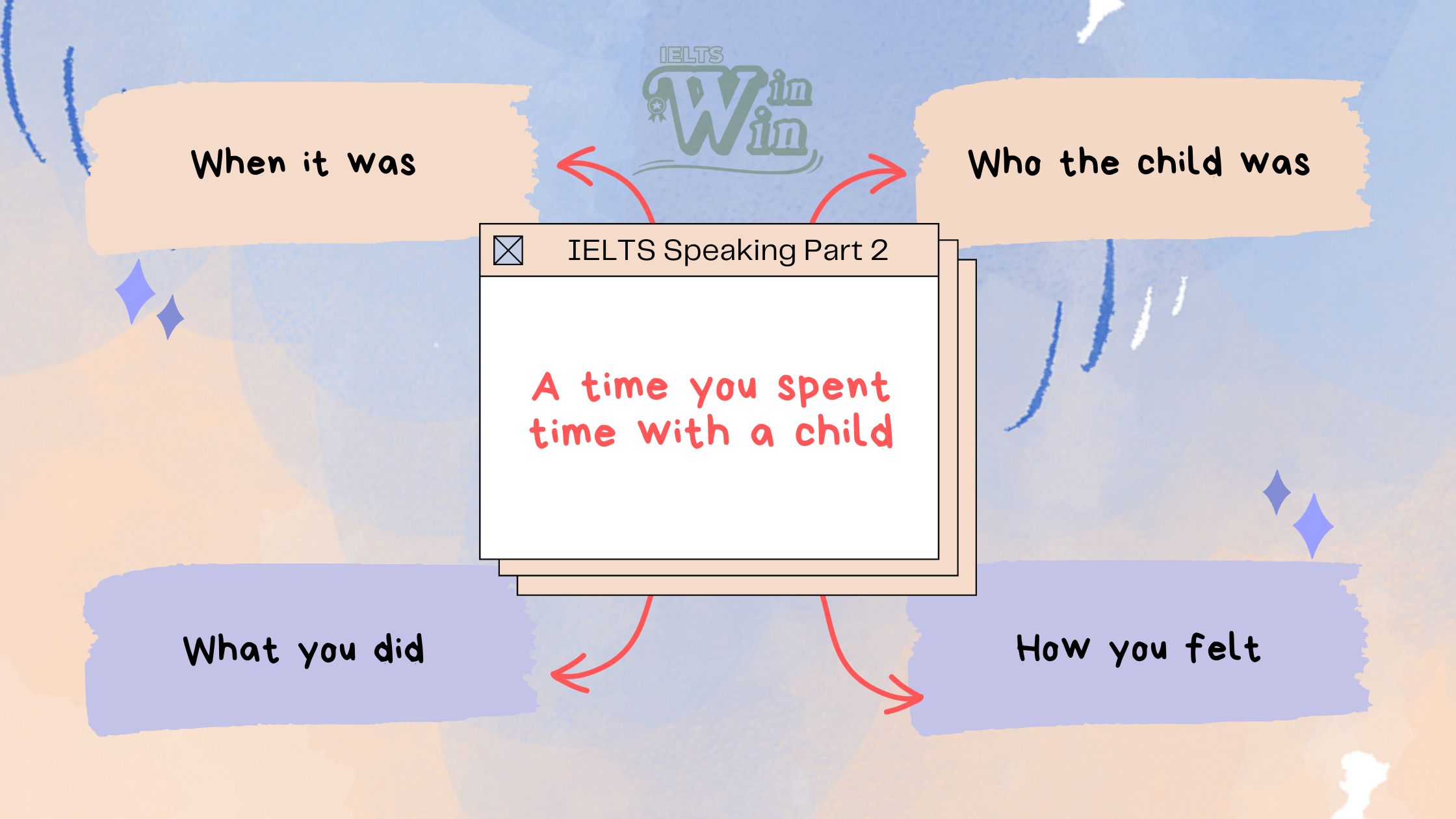✨Part 2: A time you spent time with a child
- When & who the child was
- What you did
- How you felt
One particular experience that stands out in my memory is the time I spent with my young cousin during his visit to our family last summer. Despite his reputation for being a bit mischievous and full of energy, I was determined to make the most of our time together and create lasting memories.
It was a sunny afternoon, and I found myself tasked with entertaining my energetic cousin. We decided to make the most of the weather and headed to a nearby park to engage in various outdoor activities such as exploring the playground, and even flying a kite. Interacting with my young cousin was a unique experience filled with laughter, energy, and occasional mischief. Despite his occasional mischievous antics, it was fascinating to witness his boundless enthusiasm and the joy he found in simple activities. Throughout our time together, I experienced a mix of emotions. There were moments of amusement as my cousin's innocent and carefree nature brought a smile to my face. I also felt a sense of responsibility as I tried to ensure his safety while allowing him to explore and have fun. There were instances when his high energy level tested my patience, but overall, I felt a deep sense of love and connection with my young cousin. Engaging with a child allowed me to tap into my own sense of playfulness and embrace the simple joys of life. It reminded me of the importance of cherishing the present moment, finding delight in the little things, and appreciating the wonder and curiosity that children naturally possess.
In conclusion, spending time with my young cousin, despite his occasionally challenging behavior, was a rewarding experience. It was a reminder to embrace the innocence and wonder that children bring into our lives.
- stands out /stændz aʊt/ v. phr. - nổi bật, nổi trội
- reputation /ˌrepjʊˈteɪʃən/ n. - danh tiếng, tiếng tăm
- mischievous /ˈmɪstʃəvəs/ adj. - nghịch ngợm, tinh nghịch
- entertaining /ˌentərˈteɪnɪŋ/ adj. - giải trí, thú vị
- energetic /ˌenərˈdʒetɪk/ adj. - năng động, sôi nổi
- playground /ˈpleɪɡraʊnd/ n. - sân chơi, khu vui chơi
- mischief /ˈmɪstʃɪf/ n. - trò nghịch ngợm, trò tinh nghịch
- antics /ˈæntɪks/ n. - trò hề, trò đùa
- boundless /ˈbaʊndlɪs/ adj. - vô hạn, không giới hạn
- enthusiasm /ɪnˈθjuːziæzəm/ n. - lòng nhiệt tình, sự hăng hái
- amusement /əˈmjuːzmənt/ n. - sự giải trí, sự vui chơi
- carefree /ˈkeəfriː/ adj. - thoải mái, không lo lắng
- responsibility /rɪˌspɒnsəˈbɪləti/ n. - trách nhiệm
- patience /ˈpeɪʃəns/ n. - lòng kiên nhẫn, sự nhẫn nại
- playfulness /ˈpleɪfəlnəs/ n. - tính vui nhộn, tính đùa giỡn
- embrace /ɪmˈbreɪs/ v. - ôm, ôm chặt
- curiosity /ˌkjʊərɪˈɒsɪti/ n. - sự tò mò, sự hiếu kỳ
- possess /pəˈzes/ v. - sở hữu, có
- innocence /ˈɪnəsəns/ n. - sự trong sáng, sự vô tội
Part 3
✨Is it important for parents to spend time with their child?
Yes, it is crucial for parents to spend time with their children. Quality time spent together allows parents to establish strong emotional bonds, provide guidance, and support their child's overall development. By engaging in activities together, parents can better understand their child's needs, interests, and challenges, fostering a sense of security and trust. Furthermore, parental involvement has a positive impact on a child's cognitive, social, and emotional well-being, enhancing their self-esteem and overall life satisfaction.
- establish /ɪˈstæblɪʃ/ v. - thiết lập, thành lập
- fostering /ˈfɒstərɪŋ/ n. - sự nuôi dưỡng, sự chăm sóc
- cognitive /ˈkɒɡnɪtɪv/ adj. - nhận thức, nhận thức được
- self-esteem /ˌself ɪˈstiːm/ n. - lòng tự trọng, lòng tự tin
✨Do you think parents now spend less time with their children than in the past? Why?
There is a perception that parents today may spend less time with their children compared to the past. This can be attributed to various factors. Firstly, modern lifestyles often involve demanding work schedules and other responsibilities, leaving parents with limited time for family interactions. Additionally, societal changes and increased opportunities for individual pursuits have led to busier lifestyles. Technological advancements, such as smartphones and social media, can also distract parents and impact the amount of time they allocate to direct interactions with their children. However, it is important to note that this may not be true for all parents, as there are families who prioritize spending quality time together despite these challenges.
- perception /pəˈsepʃən/ n. - sự nhận thức, sự lĩnh hội
- responsibilities /rɪˌspɒnsəˈbɪlətiz/ n. - các trách nhiệm
- societal /səˈsaɪəti/ adj. - thuộc về xã hội, của xã hội
- allocate /ˈæləkeɪt/ v. - phân bổ, phân chia
- prioritize /praɪˈɒrɪtaɪz/ v. - ưu tiên, đặt hàng đầu
✨Who usually takes care of children in Vietnam?
In Vietnam, the responsibility of caring for children is often shared among family members. In traditional Vietnamese culture, extended family members, such as grandparents, aunts, or uncles, play an active role in childcare. Additionally, in urban areas, where both parents may work outside the home, childcare services such as daycare centers or nannies can be employed to assist in taking care of children.
- extended /ɪkˈstendɪd/ adj. - kéo dài, mở rộng
- daycare /ˈdeɪkeə/ n. - trường mẫu giáo, nhà trẻ
- nannies /ˈnæniz/ n. - người giúp việc, người trông trẻ (thường là phụ nữ)
✨What do Vietnamese parents do if they are both busy and can't look after their little kids?
In situations where both parents are busy and unable to personally care for their young children, Vietnamese parents may seek alternative arrangements. They may rely on the support of extended family members, such as grandparents, aunts, or uncles, who are often willing to assist in caring for the children. Some parents may also choose to hire professional caregivers or utilize daycare services to ensure their children receive proper care and supervision.
- alternative /ɔːlˈtɜːrnətɪv/ adj. - thay thế, lựa chọn khác
- caregivers /ˈkeəˌɡɪvəz/ n. - người chăm sóc, người nuôi dưỡng
- utilize /ˈjuːtɪlaɪz/ v. - sử dụng, tận dụng
- supervision /ˌsuːpəˈvɪʒən/ n. - sự giám sát, sự điều hành
✨Do you think there are too many rules for young children to follow, whether at school or at home?
The number of rules for young children to follow can vary depending on cultural, societal, and familial factors. While rules and guidelines are important for children's safety, well-being, and development of discipline, it is essential to strike a balance. Excessive rules can create a rigid and restrictive environment that may hinder a child's creativity, independence, and critical thinking. To illustrate, overly strict rules may limit a child's ability to explore and learn from their own experiences. When children are constantly told what to do and how to behave without room for autonomy, they may struggle to develop decision-making skills and self-confidence. It is important to provide children with opportunities to make choices, take risks within safe boundaries, and learn from the consequences of their actions. Therefore, while rules play a crucial role in shaping a child's behavior and fostering a safe and orderly environment, it is important to strike a balance. Excessive rules can stifle a child's development and hinder their creativity and independence. By providing reasonable and age-appropriate guidelines, involving children in rule-making, and encouraging their autonomy within safe boundaries, we can promote their overall well-being and growth.
- guidelines /ˈɡaɪdlaɪnz/ n. - hướng dẫn, nguyên tắc
- discipline /ˈdɪsəplɪn/ n. - kỷ luật, kỉnh điển
- strike a balance /straɪk ə ˈbæləns/ v. phr. - đạt được sự cân bằng
- excessive /ɪkˈsesɪv/ adj. - quá mức, thái quá
- rigid /ˈrɪdʒɪd/ adj. - cứng nhắc, khắt khe
- restrictive /rɪˈstrɪktɪv/ adj. - hạn chế, giới hạn
- independence /ˌɪndɪˈpendəns/ n. - sự độc lập, sự tự do
- autonomy /ɔːˈtɒnəmi/ n. - sự tự trị, sự tự chủ
- self-confidence /ˌself ˈkɒnfɪdəns/ n. - lòng tự tin, sự tự tin
- opportunities /ˌɒpəˈtjuːnɪtiz/ n. - cơ hội, cơ hội thăng tiến
- boundaries /ˈbaʊndəriz/ n. - giới hạn, ranh giới
- consequences /ˈkɒnsɪkwənsɪz/ n. - hậu quả, kết quả
- stifle /ˈstaɪfl/ v. - ngăn chặn, kiềm chế
- hinder /ˈhɪndə/ v. - cản trở, làm trở ngại
- rule-making /ˈruːl meɪkɪŋ/ n. - việc lập quy định, việc tạo ra các quy tắc
✨Do you think children should follow all the rules?
Children should be taught the importance of following rules as they provide structure, promote safety, and teach responsibility. However, it is also crucial to foster critical thinking and allow children to express their opinions and ideas within a supportive and nurturing environment. There may be instances where children can be encouraged to question rules respectfully and engage in discussions to understand the reasons behind them. This helps children develop decision-making skills and a sense of autonomy while respecting the boundaries set by parents and society.
- crucial /ˈkruːʃəl/ adj. - extremely important; essential - rất quan trọng, cần thiết
- supportive /səˈpɔːrtɪv/ adj. - hỗ trợ, động viên
- nurturing /ˈnɜːrtʃərɪŋ/ adj. - nuôi dưỡng, giúp đỡ phát triển
- respectfully /rɪˈspɛktfəli/ adv. - một cách lễ phép và chu đáo
- decision-making /dɪˈsɪʒənˌmeɪkɪŋ/ n. - quá trình đưa ra quyết định
- autonomy /ɔːˈtɒnəmi/ n. - quyền tự chủ, độc lập
- boundaries /ˈbaʊndəriz/ n. - giới hạn, ranh giới
✨Do you think it is necessary for parents to make decisions for their children?
Parents play a crucial role in making decisions for their children, especially when it comes to their well-being, safety, and overall development. As primary caregivers, parents possess valuable life experiences and insights that can guide their children towards positive choices. However, it is also important for parents to gradually involve children in decision-making processes as they grow older, allowing them to develop decision-making skills, independence, and a sense of responsibility. Balancing parental guidance with age-appropriate autonomy helps children build confidence and prepares them for making decisions in their future lives.
- well-being /ˌwɛlˈbiːɪŋ/ n. - the state of being happy, healthy, and comfortable - sức khỏe, hạnh phúc và thoải mái
- caregivers /ˈkeəˌɡɪvərz/ n. - người chăm sóc, người giúp đỡ
- insights /ˈɪnsaɪts/ n. - hiểu biết sâu sắc, nhận thức
- processes /ˈprɒsɛsɪz/ n. - quá trình, tiến trình
- responsibility /rɪˌspɒnsəˈbɪlɪti/ n. - trách nhiệm, sự chịu trách nhiệm
- parental /pəˈrɛntəl/ adj. - thuộc về cha mẹ
- age-appropriate /eɪdʒ əˈprəʊpriət/ adj. - phù hợp với độ tuổi
- confidence /ˈkɒnfɪdəns/ n. - sự tự tin, tự tín
✨Do you think it is good for parents to help children choose friends?
Parents can play a supportive role in helping children choose friends by offering guidance and helping them understand the qualities of healthy friendships. Parents can encourage their children to develop relationships with peers who exhibit positive values, empathy, and mutual respect. By engaging in open and constructive conversations with their children about friendships, parents can help them navigate social dynamics, make informed choices, and develop meaningful connections with others.
- qualities /ˈkwɒlɪtiz/ n. - phẩm chất, đặc tính cá nhân
- peers /pɪəz/ n. - người cùng lứa, đồng niên
- exhibit /ɪɡˈzɪbɪt/ v. - trưng bày, trình diễn
- dynamics /daɪˈnæmɪks/ n. - động lực, tình hình tương互 giữa người và vật
✨Do you think children should have a lot of toys?
The quantity of toys that children have is subjective and may vary based on cultural and individual preferences. While toys can provide entertainment, promote creativity, and facilitate learning, it is important to strike a balance. Having a variety of toys can help children explore different interests and stimulate their imagination. However, excessive materialism or reliance on toys can hinder a child's ability to engage in imaginative play, problem-solving, and social interactions. Parents should prioritize providing a mix of toys that encourage active engagement, learning, and social interaction while considering the child's developmental needs.
- quantity /ˈkwɒntɪti/ n. - số lượng, khối lượng
- preferences /ˈprɛfərənsɪz/ n. - sở thích, lựa chọn
- facilitate /fəˈsɪlɪteɪt/ v. - tạo điều kiện, giúp đỡ
- imagination /ɪˌmædʒɪˈneɪʃən/ n. - trí tưởng tượng, sự tưởng tượng
- materialism /məˈtɪəriəˌlɪzəm/ n. - chủ nghĩa vật chất, sự coi trọng tài sản hơn giá trị tinh thần
- reliance /rɪˈlaɪəns/ n. - sự phụ thuộc, sự tin cậy
- prioritize /praɪˈɒrɪtaɪz/ v. - ưu tiên, xếp đặt theo thứ tự ưu tiên
✨Where do children in Vietnam usually play?
Children in Vietnam often engage in play in various settings depending on their living environment. In urban areas, playgrounds, parks, and recreational facilities may serve as common spaces for children to play and interact with peers. In rural areas, open fields, natural surroundings, and communal spaces offer opportunities for outdoor play. Additionally, children may engage in play at home, either indoors or in outdoor spaces, where they can utilize toys, engage in imaginative play, or participate in traditional games.
- recreational /ˌrɛkrɪˈeɪʃənəl/ adj. - giải trí, tiêu khiển
- utilize /ˈjuːtɪlaɪz/ v. - tận dụng, sử dụng
✨Is play important to children?
Play is incredibly important for children as it contributes to their overall development and well-being. Through play, children explore their environment, develop cognitive and motor skills, express creativity, and build social connections. Play provides opportunities for problem-solving, imagination, and emotional expression, fostering intellectual, emotional, and social development. It helps children develop essential skills such as communication, cooperation, and resilience, enabling them to navigate challenges and learn about the world around them.
- overall /ˌəʊvərˈɔːl/ adj. - tổng thể, toàn bộ
- cognitive /ˈkɒɡnɪtɪv/ adj. - nhận thức, liên quan đến quá trình tư duy
- intellectual /ˌɪntəˈlɛktʃʊəl/ adj. - trí tuệ, liên quan đến khả năng suy nghĩ và hiểu được ý tưởng và thông tin
- cooperation /kəʊˌɒpəˈreɪʃən/ n. - sự hợp tác, cộng tác
- resilience /rɪˈzɪljəns/ n. - sự kiên cường, sự phục hồi lại sau những trở ngại hay thất bại.
Xem thêm các bài viết về Speaking Part 2 và 3 ở đây bạn nhé
Đừng ngần ngại để lại thông tin hoặc liên hệ với chúng mình qua địa chỉ sau đây để IELTS WinWin có thể hỗ trợ tốt nhất cho bạn nhé!
Địa chỉ: 118 Nguyễn Xuân Khoát, P. Tân Thành, Q. Tân Phú, TP. Hồ Chí Minh.
Fanpage: IELTS WinWin
Zalo: 0965 439 239 – 085 301 8788
Website: ieltswinwin.com



